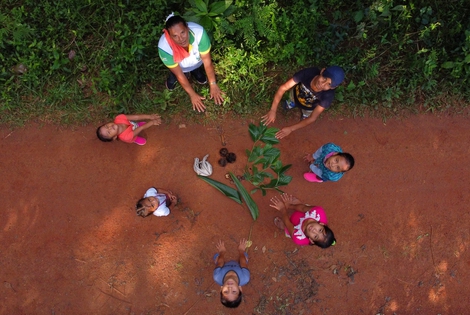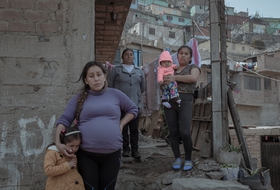
The Amazon became an alternative classroom during the pandemic. Now, the educational forest in Batraja, Bolivia, lives on to teach children and adults the value of nature.
In the Nepalese part of the Terai Arc, a narrow subtropical corridor connecting India and Nepal, women head a project of forest conservation and social development. Since 2001, they have been safeguarding biodiversity in an area of incalculable natural value, guaranteeing the “ecological, economic and socio-cultural integrity of the region”. The Terai Arc Landscape (TAL)
In the Nepalese part of the Terai Arc, a narrow subtropical corridor connecting India and Nepal, women head a project of forest conservation and social development. Since 2001, they have been safeguarding biodiversity in an area of incalculable natural value, guaranteeing the “ecological, economic and socio-cultural integrity of the region”. The Terai Arc Landscape (TAL) programme is a collaboration between the WWF and the Nepalese government. Photographer James Morgan documented women’s efforts to manage forest resources sustainably for the WWF USA.
The TAL is an area of almost 50,000 square metres and is home to eleven protected areas and two UNESCO World Heritage Sites. It is inhabited by endangered species such as the wild Asian elephant, great one-horned rhinoceros and royal Bengal tiger. It has been recognised by the WWF as one of the Global 200 ecoregions, i.e. one the 200 most important areas to protect biodiversity globally.
Vast forests, a unique wildlife and almost seven million people coexist in the Terai Arc. 61% of the human population relies on forest wood as fuel for cooking and heating. The forests are also their primary source of water, agricultural land and materials for daily use.
Through the TAL programme, local communities are tasked with safeguarding this extraordinary landscape. These communities are often headed by women because many men emigrate to find work. Thus, it is in the hands of women, assisted by training programmes run by the WWF, that the primary responsibility for managing forest resources sustainably falls.
50,000 people, of which many women, have been trained to offer basic health and nutritional services to their communities. Furthermore, the WWF finances the construction of low-emissions cooking stoves such as biogas ones, which run on gas produced via the fermentation of organic materials. This in order to stem deforestation caused by the demand for firewood as cooking fuel.
In Nepal, the Terai Arc Landscape programme is one of the many environmental conservation projects run by local communities. Since the 1980s, the Nepalese government has been giving its citizens, organised into groups called Forest User Groups (FUGs), responsibility over the sustainable use of forest resources. “Community forests” extend over almost four million hectares, over which FUGs have legal rights and responsibilities, so that they can live off of the forests without compromising their natural wealth.
Siamo anche su WhatsApp. Segui il canale ufficiale LifeGate per restare aggiornata, aggiornato sulle ultime notizie e sulle nostre attività.
![]()
Quest'opera è distribuita con Licenza Creative Commons Attribuzione - Non commerciale - Non opere derivate 4.0 Internazionale.
The Amazon became an alternative classroom during the pandemic. Now, the educational forest in Batraja, Bolivia, lives on to teach children and adults the value of nature.
One in three women have suffered physical or sexual violence. With contributions from Europe, Africa, Asia and Latin America, we look at how this shadow pandemic affects every corner of the world.
The Istanbul Convention against gender-based and domestic violence marks its tenth anniversary. We look at what it is, who its signatories are, and what the future might hold.
European Commission President Ursula von der Leyen reminded us of the gravity of violence against women around the world, and of the Istanbul Convention’s utmost importance.
President Erdoğan has pulled Turkey out of the Istanbul Convention, key in the fight against gender violence, claiming that it favours the LGBT community rather than family values.
Our species took its first steps in a world covered in trees. Today, forests offer us sustenance, shelter, and clean the air that we breathe.
Violence against women in Peru has increased as a result of Covid-19 lockdowns. 14,912 people were reported missing from January to November 2020, more than half of them minors and 64 per cent women. People have been confined to their homes for months, many forced to endure poor physical, economic and social conditions. A situation that
Joys Estefani Qqueccaño Huamani, 24, disappeared from her rural community in Peru on 9 October. Her family began looking for her independently of the authorities and despite the resistance of relatives of Joys Estefani’s ex-partner Arturo Ccana Condori, 32, charged with committing violence against her on 28 September, eleven days before Joys Estefani disappeared. Photos
Costa Rica celebrated its first same-sex marriage when two women, Alexandra Quiros and Dunia Araya, celebrated their wedding: an “extraordinary moment”.







